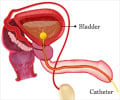E. coli strain found in retail poultry is responsible for invasive urinary tract infections (UTIs) that affect humans, says study.
Highlights:
- Contaminated retail poultry products have been detected to have the same E. Coli strain as humans who are sick with urinary tract infections (UTIs)
- The findings prove that E. coli from infected poultry can cause UTIs in humans
- More stringent practices on testing and cooking poultry might help cut down on infections
E. coli strains infect humans via contaminated meat and can cause UTIs has been proposed decades earlier. Much after that, two separate UTI outbreaks in Denmark, Canada, and the United States were postulated to have been caused by foodborne E. coli strain adding evidence to this proposal.
Following that, many studies have shown that extraintestinal pathogenic E. Coli strains routinely grow in food animals and contaminate the food supply. The likely link between foodborne E. coli and human UTIs emphasizes the public health relevance of using antibiotics in food animal production.
The E. coli sequence type 131 (ST131) strain has emerged rapidly to become the most common extraintestinal pathogenic or disease causing E. coli clones in circulation today. It can travel from the bladder to the blood and kills thousands of people in the U.S. each year.
Previous studies suggested that humans could not have gained exposure to the ST131 strain from retail meat. However, these studies were too narrowly focused and looked extensively only at multidrug-resistant ST131 strains, which typically have a different version of the gene.
The research team conducted a study where they collected data from the subjects repeatedly over one year. During this time, they analyzed retail chicken, turkey, and pork bought from every big grocery chain in Flagstaff, Arizona. In the same year, they also collected and analyzed blood and urine samples from patients who visited the only major hospital in Flagstaff.
- E. coli was present in nearly 80 % of the 2,452 meat samples
- E. coli was present in 72 % of the positive urine and blood cultures from patients
- E. coli ST131 was the most common strain infecting people and the one present on the meat samples
"In the past, we could say that E. coli from people and poultry were related to one another, but with this study, we can more confidently say that the E. coli went from poultry to people and not vice versa," said Price, who is also a Professor of Environmental and Occupational Health at Milken Institute SPH.
The study suggests poultry products might need to be routinely tested for the kind of E. coli strains that can cause UTIs, and emphasize on cooking poultry thoroughly and be handling it carefully in the kitchen.
"This particular E. coli strain appears capable of thriving in poultry and causing disease in people," said Cindy Liu, MD, MPH, PhD, first author of the paper and chief medical officer at ARAC. "Poultry products could be an important vehicle for bacteria that can cause diseases other than diarrhea."
The team is next working to measure what proportion of urinary tract infections might be caused by foodborne E. coli by looking at strains apart from ST131.
Reference:
- Liu CM, Stegger M, Aziz M, Johnson TJ, Waits K, Nordstrom L, Gauld L, Weaver B, Rolland D, Statham S, Horwinski J, Sariya S, Davis GS, Sokurenko E, Keim P, Johnson JR, Price LB., “Escherichia coli ST131-H22 as a foodborne uropathogen”. (2018) mBio 9:e00470-18. - (https://doi.org/10.1128/mBio.00470-18.)
Source-Medindia
















